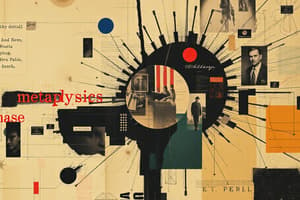Podcast
Questions and Answers
What does metaphysics primarily explore?
What does metaphysics primarily explore?
- The fundamental nature of reality (correct)
- The processes of scientific inquiry
- Moral principles and values
- The meaning of life
Which of the following is NOT a core topic of metaphysics?
Which of the following is NOT a core topic of metaphysics?
- Cosmology
- Mind-Body Problem
- Ontology
- Metaethics (correct)
What does the term 'Causality' refer to in metaphysics?
What does the term 'Causality' refer to in metaphysics?
- The existence of parallel universes
- The nature of consciousness
- The relationship between substances
- Cause-and-effect relationships (correct)
Which theory posits that there is only one fundamental substance?
Which theory posits that there is only one fundamental substance?
Who is known as the founder of Western metaphysics?
Who is known as the founder of Western metaphysics?
What is a key debate concerning consciousness in metaphysics?
What is a key debate concerning consciousness in metaphysics?
Which of the following terms describes properties of substances?
Which of the following terms describes properties of substances?
What is the primary focus of normative ethics?
What is the primary focus of normative ethics?
Flashcards
Ontology
Ontology
The study of the nature of existence, being, and reality. It explores questions like 'What is real?' and 'What is the nature of things?'
Cosmology
Cosmology
The study of the origin, structure, and ultimate fate of the universe. It delves into questions about how the universe began, how it's organized, and what will happen to it in the future.
Time and Space
Time and Space
The exploration of the nature of time, space, and causality. It grapples with questions about the nature of time itself (is it linear, cyclical?), the concept of space (is it absolute or relative?), and the relationship between cause and effect.
Mind-Body Problem
Mind-Body Problem
Signup and view all the flashcards
Free Will and Determinism
Free Will and Determinism
Signup and view all the flashcards
Substance
Substance
Signup and view all the flashcards
Attribute
Attribute
Signup and view all the flashcards
Potentiality and Actuality
Potentiality and Actuality
Signup and view all the flashcards
Study Notes
Metaphysics
- Metaphysics explores the fundamental nature of reality
- Core topics include: Ontology (existence), Cosmology (universe), Time and Space, Mind-Body Problem, Free Will vs. Determinism
- Key concepts include: Substance (basic entities), Attribute (properties of substances), Potentiality and Actuality (possibility and realization), Essence and Existence (intrinsic nature and external existence), Causality (cause-and-effect relationships)
- Theories and positions include: Monism (one fundamental substance), Dualism (two fundamental substances), Pluralism (multiple fundamental substances), Panpsychism (consciousness in all entities), Emergentism (complex systems exhibit novel properties.)
- Influential metaphysicians include: Aristotle, Immanuel Kant, René Descartes, Plato, and David Hume
- Contemporary debates include: Physicalism vs. Non-Physicalism, Determinism vs. Indeterminism, Emergentism vs. Reductionism, Panpsychism vs. Emergentism, Multiverse Hypothesis
- Key texts include Aristotle's "Metaphysics"
Ethics
- Ethics explores principles, values and norms for human behavior
- Key categories include Metaethics (nature of ethical judgments), Normative Ethics (moral rules and principles), and Applied Ethics (specific issues like bioethics)
- Ethical theories include: Utilitarianism (maximizes overall happiness), Deontology (emphasizes duties and obligations), Virtue Ethics (focuses on character traits), Consequentialism (judges actions by outcomes), and Non-Consequentialism (prioritizes motives and principles)
- Key ethical principles include: Respect for Autonomy, Non-Maleficence, Beneficence, Justice, and Veracity
- Ethical frameworks include: Moral Absolutism (universal rules), Moral Relativism (cultural factors), Principled Ethics (balances competing principles), and Care Ethics (prioritizes empathy)
- Influential ethicists include: Aristotle, Immanuel Kant, John Stuart Mill, Jean-Paul Sartre, and Simone de Beauvoir
- Key texts include: Aristotle's "Nicomachean Ethics", Immanuel Kant's "Grounding for the Metaphysics of Morals", John Stuart Mill's "Utilitarianism", Jean-Paul Sartre's "Existentialism and Humanism", and Simone de Beauvoir's "The Ethics of Ambiguity"
Politics
- Politics in philosophy explores governance, power, justice, and civic life
- Branches include Classical Political Philosophy (ancient Greek and Roman thought), Modern Political Philosophy (17th-19th century thinkers), and Contemporary Political Philosophy (20th-century debates)
- Key concepts include: Justice (distributive, retributive, restorative), Liberty (negative vs. positive), Equality (formal vs. substantive), Power (authority, coercion, persuasion), Legitimacy (right to rule), and Rights (natural, human, civil)
- Major theories include Social Contract Theory, Utilitarianism, Liberalism, Communitarianism, and Anarchism
- Influential philosophers include Plato, Aristotle, Thomas Hobbes, John Locke, Jean-Jacques Rousseau, John Rawls, Michel Foucault, and Hannah Arendt
- Key texts include Plato's "The Republic", Aristotle's "Politics", Thomas Hobbes' "Leviathan", John Locke's "Two Treatises of Government", Jean-Jacques Rousseau's "The Social Contract"
Aesthetics
- Aesthetics in philosophy explores beauty, taste, art, and creativity
- Branches include Classical Aesthetics (ancient Greek and Roman), Modern Aesthetics (18th-20th century thinkers), and Contemporary Aesthetics (current debates)
- Key concepts include Beauty (objective, subjective, relational), Taste (personal, cultural, universal), Art (definition, purpose, value), Creativity, Aesthetic Experience, and Aesthetic Judgment (criteria, standards, justification)
- Major theories include Imitation Theory, Expression Theory, Formalism, Instrumentalism, and Institutional Theory
- Influential philosophers include Plato, Aristotle, Immanuel Kant, Friedrich Nietzsche, John Dewey, and Martin Heidegger
- Key texts include Plato's "The Republic" (Book X), Aristotle's "Poetics", Kant's "Critique of Judgment", Nietzsche's "The Birth of Tragedy", and Dewey's "Art as Experience"
Studying That Suits You
Use AI to generate personalized quizzes and flashcards to suit your learning preferences.




